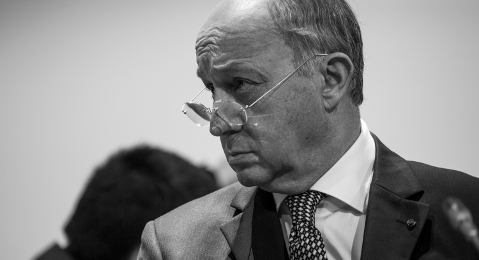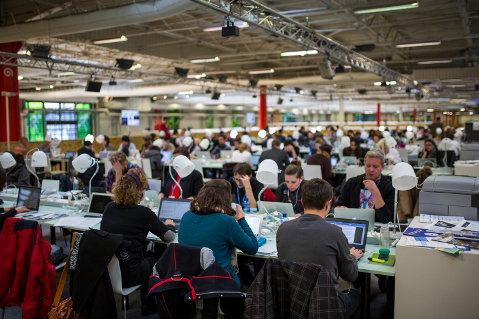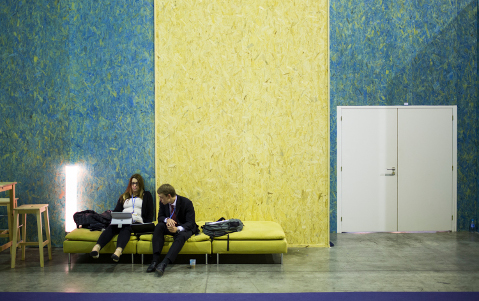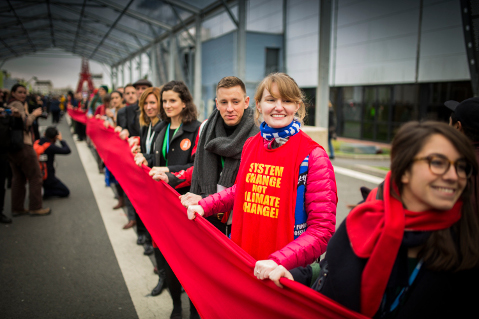The Paris Project: Day 12
Final Countdown Is on as Plans for a Mega-Protest Percolate

Waiting for history to happen is no small task. It is late Friday afternoon here in Paris and the COP21 is staggering its way toward a conclusion. Things were meant to wrap today. That was the plan all along. A historic and sweeping international climate agreement approved by 6 p.m. as per the mandate of COP21 President and French Foreign Minister Laurent Fabius. The man himself, however, emerged from behind closed-door negotiations just after lunch today to let an eager pack of journalists know that such a tidy and timely outcome was not in the works.
Back-to-back nights of essentially around-the-clock talks between only the highest level negotiators had been helpful but far from final. A weary-looking Fabius, flanked by U.N. Secretary General Ban Ki-Moon, told the assembled crowd that a “final draft” text would be delivered to the parties early Saturday morning and that he fully expected ratification by the end of the day. “We are nearly there. We are almost at the finish line.” he said, echoing sentiments and exact phrases he has used repeatedly in the last 36 hours, “I am optimistic.”

If only that was all it took, one determined manʼs optimism. Alas, when nearly 200 countries are fighting over the language of a nearly 20,000-word document that will become the most important environmental treaty of our time, the phrase “cluster fuck” comes immediately to mind. Last night, after yet another draft document was released at a meeting of Fabius’s Comité de Paris, the writing was very quickly put on the wall for todayʼs call for negotiating overtime.
The new draft, though certainly a big step forward in many key areas (more on that later), was actually a bit longer that its previous incarnation, was peppered with brackets of disagreement throughout key mitigation and financing sections about who will pay for what and when, and had deleted all specific mention of human rights, food security, and just transition from Article II; the section of the document where the “purpose” of the agreement is fleshed out. The latter was a particularly stinging blow to Civil Society interests, a feeling only amplified by the fact that it occurred on International Human Rights Day.

Last but certainly not least, major contention remained — led largely by India — around how exactly pledges to cut emissions would be revisited and potentially ratcheted up in the years ahead as science and technology and the general state of the planetʼs health evolve or devolve as the case may be. As Ken Kimmell, president of the Union of Concerned Scientists put it on Friday, “We have good down payment on our obligations to future generations [with this draft] but we donʼt have a payment plan clearly defined yet that will actually get us there.”
On the good news side of the ledger, the new draft seemed to resolve, once and for all, the debate about a 2 degree Celsius limit on allowable temperature rise. In fact, as it currently stands, the language would set 2°C as the floor rather than the ceiling for that ambition. It reads, “the aggregate effect of Partiesʼ mitigation pledges for global annual emissions of greenhouse gases by 2020 consistent with holding the increase in the global average temperature to well below 2°C above pre-industrial levels and pursuing efforts to limit the temperature increase to 1.5°C, recognizing that this would significantly reduce risks and impacts of climate change.” This alone is a huge victory for many in attendance as, just a week ago, any strong mention of holding the line at 1.5°C seemed about as likely as unicorns being proven real.
Another positive development, teased out by the analytics folks with the ParisAgreement.org, is that Thursdayʼs night draft represented an 88 percent reduction in brackets and options from the previous draft unveiled on Wednesday afternoon. In fact, 10 of the 18 sections are now completely bracket free.

After releasing the text around 8 p.m., Fabius instructed nations to return to the negotiating chambers, a realm he dubbed the “indaba of solutions” at 11:30 p.m. for what proved to be a true all-night session of talks. Even more indicative of the high stakes, he allowed each delegation only three negotiators from here on out in the indaba. “We must find the responsibility for common ground. It is time to come to an agreement.” declared the COP21 president at the brief open sessionʼs close.
And, by and large, that is where we remain today, the sun just starting to set on what was supposed to be the last day of this two-week conference. Negotiators have been all but impossible to find today as they horse trade in private sessions. Though, one rumor that seems to be gaining traction toward actual fact is that a coalition of nations, led by Mexico and including the European Union and Canada, have pulled a bit of brinksmanship on the topic of human rights, demanding that language about indigenous rights, food safety, gender equality, and health be put back into Article II. And then there are the protests.
A vast network of activists, including folks like 350.org, are promising to break Franceʼs current emergency ban on public assembly and take to the ages old streets of Paris tomorrow by the thousands in series of actions unfolding roughly around when a vote could be held on Fabius’s promised final draft. Tune in next time to this roller coaster, climate chaos, international bureaucratic mellow drama that has the fate of our natural world hanging in the balance. The Paris Project will be there with front row seats, and our eyes wide open.




